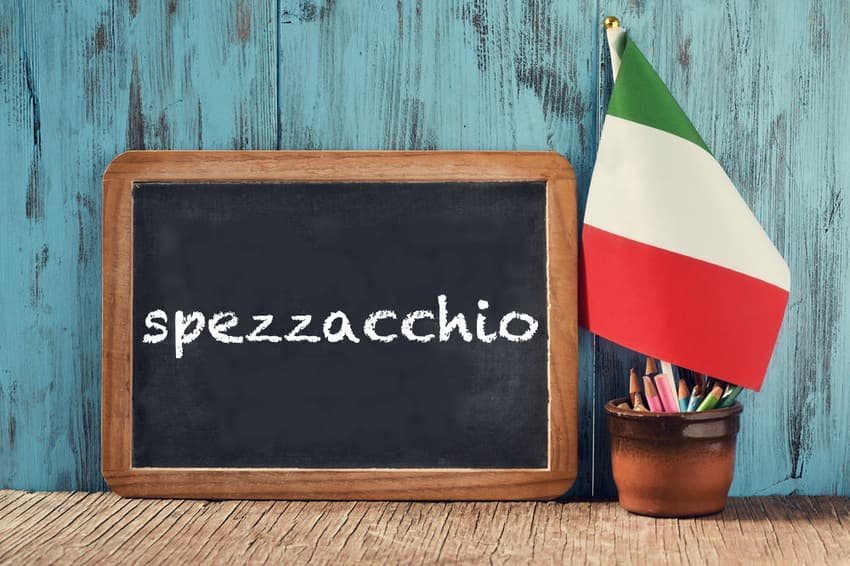
Italian word of the day: 'Spezzacchio'

Today's word is in honour of Rome's wonky Christmas tree.
Alas, poor Spezzacchio.
Thus has Rome's official Christmas tree been dubbed, just hours after its arrival in the capital's Piazza Venezia. But what does the nickname mean?
Benvenuto a #Spezzacchio successore di @SpelacchioReal . pic.twitter.com/av4dXnrf6I
— Guido Righini (@guido_righini) December 3, 2018
You won't find it in the dictionary, so let's divide it into its parts: first, the verb spezzare, which means 'to break' or 'to split'. It can be literal...
Gli spezzò la gamba.
He broke his leg.
... or figurative.
Mi spezzi il cuore!
You're breaking my heart!
It's not always negative: spezzare is often used to mean simply breaking something into pieces, separating or dividing it.
Abbiamo spezzato il viaggio in più tappe.
We broke up the journey with several stops.
In menswear, for instance, a spezzato suit is one worn separately, i.e. mixing and matching jacket and trousers, and it's rather dashing.

Spezzato: a good look. Photo: Gabriel Bouys/AFP
If you suspect that Spezzacchio isn't exactly a compliment, though, you'd be right. This is where the second part of the word comes in: ~acchio, a suffix that you can add to the end of a word to imply that it's small, poor or imprecise.
This part's a bit trickier to pin down: it might be a regional variation of the pejorative suffix ~accio (the same one we looked at in the word giornataccia, or 'bad day').
Alternatively, it could be a subtly different one that functions a bit like '~ish' in English, to show that something doesn't exactly fit the bill.
Ha gli occhi verdacchio.
His eyes are greenish.
But when you attach ~acchio to a noun, it usually implies that it's small or young: an orsacchio (orso + acchio), for instance, is a 'little bear'.
One more (charitable) possibility: ~acchio can also be the equivalent of our suffix '~er' in English, which shows that something performs a particular action or purpose.
battere + acchio = batacchio
to knock + er = (door)knocker
So Spezzachio is either 'crappy broken thing', 'sort of broken thing', 'little broken thing', or simply 'broken thing'.
None of them are exactly what you'd want your new Christmas tree to be called – but it is arguably better than Spelacchio, last year's threadbare fir, whose nickname derived from the verb spelare ('to pluck') and translated roughly to 'Baldy' or 'Mangy'. Or, as some wags dubbed it, The Toilet Brush.
Welcome #spelacchio, Roma te salutat #piazzavenezia pic.twitter.com/48t7g0y3df
— LauraDeliQuintiliani (@AvvLauraDeliQ) December 8, 2017
Do you have a favourite Italian word, phrase or expression you'd like us to feature? If so, please email our editor Jessica Phelan with your suggestion.
Comments
See Also
Alas, poor Spezzacchio.
Thus has Rome's official Christmas tree been dubbed, just hours after its arrival in the capital's Piazza Venezia. But what does the nickname mean?
Benvenuto a #Spezzacchio successore di @SpelacchioReal . pic.twitter.com/av4dXnrf6I
— Guido Righini (@guido_righini) December 3, 2018
You won't find it in the dictionary, so let's divide it into its parts: first, the verb spezzare, which means 'to break' or 'to split'. It can be literal...
Gli spezzò la gamba.
He broke his leg.
... or figurative.
Mi spezzi il cuore!
You're breaking my heart!
It's not always negative: spezzare is often used to mean simply breaking something into pieces, separating or dividing it.
Abbiamo spezzato il viaggio in più tappe.
We broke up the journey with several stops.
In menswear, for instance, a spezzato suit is one worn separately, i.e. mixing and matching jacket and trousers, and it's rather dashing.

Spezzato: a good look. Photo: Gabriel Bouys/AFP
If you suspect that Spezzacchio isn't exactly a compliment, though, you'd be right. This is where the second part of the word comes in: ~acchio, a suffix that you can add to the end of a word to imply that it's small, poor or imprecise.
This part's a bit trickier to pin down: it might be a regional variation of the pejorative suffix ~accio (the same one we looked at in the word giornataccia, or 'bad day').
Alternatively, it could be a subtly different one that functions a bit like '~ish' in English, to show that something doesn't exactly fit the bill.
Ha gli occhi verdacchio.
His eyes are greenish.
But when you attach ~acchio to a noun, it usually implies that it's small or young: an orsacchio (orso + acchio), for instance, is a 'little bear'.
One more (charitable) possibility: ~acchio can also be the equivalent of our suffix '~er' in English, which shows that something performs a particular action or purpose.
battere + acchio = batacchio
to knock + er = (door)knocker
So Spezzachio is either 'crappy broken thing', 'sort of broken thing', 'little broken thing', or simply 'broken thing'.
None of them are exactly what you'd want your new Christmas tree to be called – but it is arguably better than Spelacchio, last year's threadbare fir, whose nickname derived from the verb spelare ('to pluck') and translated roughly to 'Baldy' or 'Mangy'. Or, as some wags dubbed it, The Toilet Brush.
Welcome #spelacchio, Roma te salutat #piazzavenezia pic.twitter.com/48t7g0y3df
— LauraDeliQuintiliani (@AvvLauraDeliQ) December 8, 2017
Do you have a favourite Italian word, phrase or expression you'd like us to feature? If so, please email our editor Jessica Phelan with your suggestion.
Join the conversation in our comments section below. Share your own views and experience and if you have a question or suggestion for our journalists then email us at [email protected].
Please keep comments civil, constructive and on topic – and make sure to read our terms of use before getting involved.
Please log in here to leave a comment.